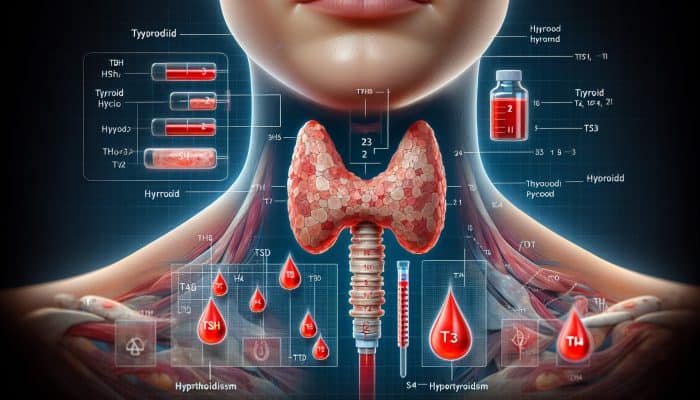Unlock Your Health: A Detailed Guide to Thyroid Blood Tests
Why Thyroid Blood Tests Are Essential for Your Overall Health

A Thyroid Blood Test conducted in Norwich serves as a crucial diagnostic tool that evaluates the levels of thyroid hormones in your bloodstream. This essential test delivers comprehensive insights into your thyroid function, which is vital, as the thyroid gland, shaped like a butterfly and located in the neck, plays a significant role in regulating numerous bodily functions. These include metabolism, energy levels, and overall well-being. By measuring hormone levels such as TSH (Thyroid Stimulating Hormone), T3 (triiodothyronine), and T4 (thyroxine), healthcare professionals can identify conditions like hypothyroidism (an underactive thyroid) and hyperthyroidism (an overactive thyroid). If left unaddressed, each of these disorders can lead to serious health complications.
Grasping the importance of regular thyroid evaluations is essential for effective health management and overall wellness. Many individuals confronting thyroid issues may not display evident symptoms, highlighting the necessity for routine testing to facilitate early detection and prompt intervention. If you are facing unexplained fatigue, unexpected weight changes, or emotional fluctuations, a thyroid blood test could be pivotal in shedding light on your health and guiding your health management strategies.
 Understanding Thyroid Function Tests: Key Information You Need
Understanding Thyroid Function Tests: Key Information You Need
There exists a variety of thyroid function tests routinely performed to evaluate different aspects of thyroid hormone levels. The most commonly conducted tests encompass:
- TSH Test: This vital test gauges the levels of Thyroid Stimulating Hormone in your bloodstream, a key player in regulating the production of T3 and T4 hormones.
- T4 Test: This test measures the total concentration of thyroxine in your blood, offering insights into your thyroid’s overall functionality and health.
- T3 Test: This evaluation assesses the level of triiodothyronine, which is crucial for diagnosing conditions such as hyperthyroidism.
- Free T4 and Free T3 Tests: These tests evaluate the unbound (active) forms of T4 and T3 hormones, providing a clearer picture of thyroid activity and function.
- Thyroid Antibody Tests: These tests identify autoimmune disorders like Hashimoto’s thyroiditis or Graves’ disease by detecting specific antibodies present in the blood.
Comprehending the differences and nuances of each test empowers patients to engage more actively in discussions with their healthcare providers regarding their thyroid health. Consulting with your doctor will assist in determining which tests are most appropriate based on your symptoms and medical history.
How to Prepare Effectively for Your Thyroid Test to Ensure Reliable Results
Effective preparation for a thyroid test is essential to guarantee the accuracy of your results. Generally, fasting for several hours before the test is advised to eliminate any potential interference. Additionally, it is crucial to inform your healthcare provider about any medications you are currently taking, as certain medications can significantly influence hormone levels. For example, medications such as steroids or those containing biotin may interfere with the results.
Your healthcare provider might provide specific instructions, which could involve avoiding certain foods or supplements before the test. Furthermore, it is wise to refrain from vigorous physical activity on the day of the test, as this can affect hormone levels. Being well-informed about these preparatory steps will help ensure that your results are as accurate as possible, enabling timely and effective medical interventions when necessary.
How to Find a Reliable Provider for Thyroid Blood Testing in Norwich

Locating Local Clinics Providing Dependable Thyroid Testing Services
Norwich boasts a variety of local clinics where you can conveniently access thyroid blood tests. These facilities offer a practical means to receive diagnostic testing without the inconvenience of a hospital visit. It is recommended to consult with your GP, who can provide referrals to specific clinics, or you can search online for options in your area. Here are some notable clinics offering thyroid testing in Norwich:
- Norwich Medical Practice: This clinic provides comprehensive thyroid testing services along with follow-up care tailored to patient needs.
- Colney Health: This facility offers a wide range of blood tests, including thorough assessments of thyroid function.
- Broadland Medical Practice: Renowned for its patient-centred approach to effectively managing thyroid health.
- St. Stephen’s Pharmacy: This pharmacy delivers private testing services with quick turnaround times for results, ensuring prompt care.
These clinics are equipped with state-of-the-art facilities and staffed by qualified professionals, making them excellent options for your thyroid testing requirements.
What to Expect from Hospital Services for Comprehensive Thyroid Testing
In addition to local clinics, hospitals in Norwich provide exceptional thyroid testing services, typically through their endocrinology departments or general pathology labs. The Norfolk and Norwich University Hospital is a prominent facility renowned for delivering thorough thyroid testing. Here, a multidisciplinary team evaluates your thyroid function, ensuring you receive accurate diagnoses and tailored treatment strategies.
The hospital is outfitted with advanced diagnostic technology, including the latest tools for hormone analysis. If your condition requires further investigation or specialised care, the hospital’s endocrinologists are readily available to assist you in effectively managing your thyroid health. Accessing hospital services can be particularly advantageous for individuals who may need additional referrals or complex testing.
Weighing the Advantages of Private Testing Options in Norwich

If you seek quicker results or more flexible appointment times, private testing centres in Norwich can serve as an excellent alternative for thyroid blood tests. These facilities commonly provide expedited services, allowing you to receive your test results significantly faster than traditional NHS routes.
Many private clinics, such as The Health Clinic Norwich, deliver comprehensive thyroid testing while prioritising patient convenience and care. Several private options also permit direct access testing, enabling you to book and pay for your test without requiring a GP referral. While private testing may incur higher fees, it can result in quicker diagnoses and prompt initiation of treatment, which is particularly beneficial for those experiencing concerning symptoms.
Expert Guidance on Interpreting Your Thyroid Blood Test Results in Norwich
Decoding the Implications of Your Thyroid Test Results for Your Health
Understanding the implications of your thyroid test results is crucial for effective health management. A normal TSH range typically falls between 0.4 and 4.0 mIU/L, while T3 and T4 levels have defined normal ranges as well. If your results reveal low TSH and high T4 levels, it may indicate hyperthyroidism, whereas high TSH coupled with low T4 typically suggests hypothyroidism.
Real-life case studies underscore the importance of accurately interpreting these results. For example, a patient presenting with fatigue and unexplained weight gain may receive a diagnosis of hypothyroidism if their TSH levels are elevated. Conversely, another patient experiencing a rapid heartbeat and weight loss might be diagnosed with hyperthyroidism if their T3 levels are significantly high. It is essential to consult with your healthcare provider to comprehend not only the numerical values but also the broader implications of your thyroid function, along with the necessary next steps based on your results.
How Often Should You Schedule Thyroid Testing?
The frequency of thyroid testing largely depends on your health status, any pre-existing thyroid conditions, and specific risk factors. For individuals without thyroid-related issues, routine testing every five years is generally recommended. However, for those with a history of thyroid disorders or those experiencing symptoms, more frequent testing may be warranted.
Your healthcare provider will evaluate your unique circumstances and propose an appropriate testing schedule. For instance, patients on thyroid medication might need to have their hormone levels checked every three to six months to ensure proper dosage adjustments. Taking a proactive approach to thyroid monitoring can significantly enhance effective management and minimise the risk of complications.
Essential Steps to Take After Receiving Your Thyroid Test Results
Once you obtain your thyroid test results, it is vital to consult with your healthcare provider to discuss their significance. Depending on your findings, your doctor may suggest additional testing to confirm a diagnosis or initiate treatment if a thyroid condition is identified.
Understanding your results is merely the beginning; developing a comprehensive treatment plan—whether it involves medication, lifestyle modifications, or ongoing monitoring—is of utmost importance. Actively engaging in these discussions empowers you to make informed decisions regarding your health and well-being, leading to improved health outcomes.
Where Can You Access a Comprehensive Thyroid Blood Test in Norwich?
You can obtain a thyroid blood test at various convenient locations throughout Norwich, including GP offices, private clinics, and hospitals. When selecting a testing facility, consider factors such as location, waiting times, and patient reviews to ensure you choose a reputable and accessible option that meets your needs.
Your GP can guide you toward local clinics, or you might explore private options for quicker access. It is crucial to choose a facility that not only meets your logistical requirements but also possesses a strong reputation for quality and accuracy in thyroid testing.
Identifying Symptoms That May Indicate Thyroid Disorders
Recognising Common Symptoms Linked to Hypothyroidism
Hypothyroidism, often referred to as an underactive thyroid, manifests a variety of symptoms that frequently go unnoticed until they significantly affect quality of life. Typical signs encompass persistent fatigue, unexplained weight gain, heightened sensitivity to cold, dry skin, and hair loss. Early identification of these symptoms is critical, as untreated hypothyroidism can result in severe complications.
For instance, an individual may attribute their fatigue to stress or the natural aging process, failing to recognise it as a potential indicator of thyroid dysfunction. Early diagnosis often paves the way for effective management, generally through medication that restores hormonal balance, ultimately enhancing energy levels and overall well-being.
How to Identify Symptoms of Hyperthyroidism
Conversely, hyperthyroidism presents a distinct set of symptoms, which may include noticeable weight loss, rapid heartbeat, heightened anxiety, and increased sensitivity to heat. Recognising these signs is crucial to ensuring prompt medical intervention.
For example, someone experiencing inexplicable weight loss and increased sweating may be suffering from hyperthyroidism and should seek medical advice without delay. Ignoring these symptoms can lead to serious health complications, including cardiovascular problems, if not addressed promptly.
When Should You Consult a Doctor About Thyroid Symptoms?
If you experience persistent symptoms that may suggest potential thyroid issues, such as fatigue, weight changes, or mood disturbances, it is crucial to consult a doctor for a thorough evaluation. Early assessment through a thyroid blood test can confirm or rule out thyroid dysfunction, facilitating timely intervention and effective management.
Proactively addressing these symptoms with your healthcare provider can significantly improve your health outcomes and enhance your quality of life. Do not hesitate to seek medical advice if you have concerns about your thyroid health.
The Procedure for Undergoing a Thyroid Blood Test
Understanding the Blood Collection Process for Thyroid Testing
The process of obtaining a thyroid blood test is straightforward and minimally invasive. Typically, a healthcare professional collects a small sample of blood from a vein in your arm using a sterile needle. This procedure generally takes only a few minutes and is usually well tolerated by patients.
Once the blood is drawn, it is placed in a vial and sent to a laboratory for analysis. This method allows for the measurement of thyroid hormone levels, which are essential for diagnosing potential thyroid disorders. While some individuals may experience slight discomfort during the blood draw, the process is quick and efficient.
What Occurs to Your Blood Sample After Collection?
Following the collection, the blood sample undergoes multiple laboratory procedures to determine thyroid hormone levels. The analysis process generally includes the following steps:
- Labelling: The sample is clearly labelled with patient information to ensure precise tracking and identification.
- Centrifugation: The blood sample is spun in a centrifuge to separate the serum from other blood components.
- Testing: The serum is then tested for TSH, T3, and T4 hormone levels using advanced immunoassay techniques.
- Reporting: Results are compiled and sent to your healthcare provider for review and interpretation.
Each of these steps is crucial for obtaining reliable results that guide your diagnosis and treatment plan. Understanding this process demystifies thyroid testing and highlights its significance in managing thyroid health effectively.
What Is the Expected Turnaround Time for Thyroid Test Results?
The time it takes to receive thyroid test results can vary based on the laboratory’s workload and the specific tests performed. Generally, patients can expect to receive their results within a few days to a week.
In private clinics, results may be available even sooner, often within 24 to 48 hours, facilitating prompt decision-making regarding treatment options. It is advisable to inquire with your healthcare provider about the expected turnaround time when having your blood drawn, enabling you to plan accordingly for follow-up consultations.
Effective Strategies for Enhancing Thyroid Blood Testing in Norwich
Selecting the Right Testing Facility for Accurate Results
Choosing the appropriate testing facility is vital for obtaining accurate thyroid test results. When searching for a reputable testing centre in Norwich, consider the following factors:
- Accreditation: Ensure the facility is accredited by relevant health authorities, confirming adherence to quality standards.
- Reputation: Look for patient reviews and testimonials regarding their experiences with the facility.
- Staff Expertise: Verify that the personnel conducting the tests are qualified and experienced in the field of thyroid testing.
- Facilities: Assess the technology and equipment utilized at the facility for the testing process.
By adhering to these guidelines, you can make informed decisions regarding where to have your thyroid tests conducted, ensuring quality care and accurate results.
How to Prepare Effectively for Your Thyroid Test Appointment
Proper preparation for your thyroid test appointment is essential for ensuring the accuracy of your results. Follow any fasting or medication guidelines provided by your healthcare provider. For instance, if instructed to fast, refrain from consuming anything except water for several hours prior to the test.
Additionally, compile a list of any medications, supplements, or vitamins you are currently taking and discuss these with your doctor, as they may influence your results. Being aware of these preparatory measures can significantly impact the accuracy of your testing outcomes.
What to Expect During Your Blood Test Procedure
Upon arrival for your thyroid blood test, you can anticipate a quick and relatively painless process. A trained nurse or phlebotomist will prepare you, ensuring you feel comfortable throughout the procedure. They will clean the area on your arm from which the blood will be drawn and then insert a sterile needle to collect the sample.
Most patients experience minimal discomfort, often described as a brief pinch. After drawing the blood, a small bandage will be applied to the site. Generally, you can return to your normal activities immediately, unless otherwise directed by your healthcare provider.
Interpreting Your Thyroid Test Results: Understanding Their Significance
Gaining the ability to interpret your thyroid blood test results is vital for effective health management. Normal TSH levels typically range between 0.4 and 4.0 mIU/L, while T3 and T4 levels may vary. Understanding these ranges helps you identify when your results fall outside of normal parameters.
Abnormal levels can indicate various thyroid disorders, and your healthcare provider will assist you in understanding what these findings mean in relation to your overall health. Engaging in conversations about your results is crucial for creating a customised approach to your thyroid management, enabling you to make informed health decisions.
The Importance of Regular Thyroid Monitoring
How Routine Testing Can Help Prevent Complications
Engaging in regular thyroid monitoring is essential for preventing complications associated with thyroid disorders. Conditions such as hypothyroidism and hyperthyroidism can lead to severe health issues, including cardiovascular diseases, osteoporosis, and reproductive complications if left undiagnosed or untreated.
By scheduling routine thyroid tests, patients can swiftly identify any abnormalities and take appropriate actions to mitigate these risks. This proactive approach significantly enhances long-term health outcomes and overall quality of life, ensuring that your thyroid health remains a priority.
Effectively Managing Existing Thyroid Conditions Through Monitoring
For individuals already diagnosed with thyroid conditions, consistent monitoring is crucial for effective management. Regular assessments of hormone levels allow for timely adjustments to treatments, ensuring that patients receive the correct dosage of medication necessary for their condition.
- Enhanced Energy Levels: Ongoing testing facilitates personalised treatment plans that can improve energy and vitality.
- Weight Regulation: Adjusting treatments based on test results supports effective weight management.
- Mood Stabilisation: Continuous monitoring aids in mood regulation for individuals with thyroid dysfunction.
- Preventing Further Health Complications: Early detection and intervention in case of fluctuations can avert more severe conditions.
Effective management through regular testing enables those with thyroid issues to lead healthier, more balanced lives, reducing the impact of their condition on daily activities.
Promoting Overall Health and Well-Being Through Thyroid Monitoring
Regular monitoring of thyroid health plays a significant role in maintaining overall well-being. By ensuring that thyroid hormone levels remain within normal ranges, patients can sustain stable energy levels, manage their weight effectively, and experience improved mood stability.
This holistic approach to health empowers individuals to take control of their thyroid management, ultimately leading to greater life satisfaction and physical well-being. Routine check-ups ensure that patients stay informed about their health status, enabling them to make necessary lifestyle changes for optimal health.
The Importance of Early Detection of Thyroid Issues
One of the most significant advantages of regular thyroid monitoring is the early identification of potential thyroid issues. Detecting problems before they escalate allows for timely intervention and improved health outcomes. Symptoms such as fatigue or unexplained weight changes may suggest thyroid dysfunction, but regular testing can confirm or rule out these concerns.
Early detection enables healthcare professionals to initiate treatments that effectively restore hormonal balance, greatly enhancing patients’ quality of life while reducing the risk of complications associated with untreated thyroid disorders.
The Necessity of Personalised Treatment Plans for Optimal Management
Consistent thyroid monitoring is pivotal in developing personalised treatment plans tailored to individual patient needs. As hormone levels fluctuate, healthcare providers can adjust treatments accordingly, ensuring that each patient’s unique situation is considered in their care.
This personalised approach enhances the effectiveness of thyroid management, helping patients achieve optimal results. Regular consultations and testing are integral to this ongoing process, enabling healthcare providers to refine treatment strategies for the best possible outcomes.
Frequently Asked Questions About Thyroid Blood Tests
What Is the Primary Purpose of a Thyroid Blood Test?
A thyroid blood test measures hormone levels to evaluate thyroid function, assisting in diagnosing conditions like hypothyroidism and hyperthyroidism.
How Should I Prepare for a Thyroid Blood Test?
Preparation may involve fasting for several hours and avoiding specific medications. Your healthcare provider will provide tailored instructions based on your individual needs.
How Long Will It Take to Receive My Thyroid Test Results?
Typically, you can expect results within a few days to a week, depending on the testing facility and the specific tests ordered.
What Do Abnormal Thyroid Test Results Indicate?
Abnormal results may signify thyroid dysfunction, such as hypothyroidism or hyperthyroidism, requiring further evaluation and treatment.
Is It Possible to Obtain a Thyroid Blood Test Without a Doctor’s Referral?
Yes, many private clinics provide direct access testing, allowing you to book and pay for a thyroid test without a referral.
What Symptoms Should Prompt Me to Seek a Thyroid Test?
Symptoms such as fatigue, weight fluctuations, mood swings, and temperature sensitivity should prompt a discussion with your doctor regarding thyroid testing.
How Often Should I Have My Thyroid Levels Checked?
The frequency of testing depends on your health condition; individuals with thyroid disorders are often advised to test every three to six months.
Can Lifestyle Modifications Influence Thyroid Function?
Yes, lifestyle factors such as diet, exercise, and stress management can significantly affect thyroid function and overall hormonal balance.
What Occurs During a Thyroid Blood Test?
A small amount of blood is drawn from a vein, typically in your arm, which is then sent to a laboratory for analysis of thyroid hormones.
Is a Thyroid Blood Test Painful?
The blood draw may cause a brief pinch or prick, but it is generally well-tolerated and not considered painful by most individuals.
Connect with us on Facebook!
This Article Was First Found On https://bloodtest.co.uk
The Article Thyroid Blood Test: Your Essential Guide in Norwich Was Found On https://limitsofstrategy.com


